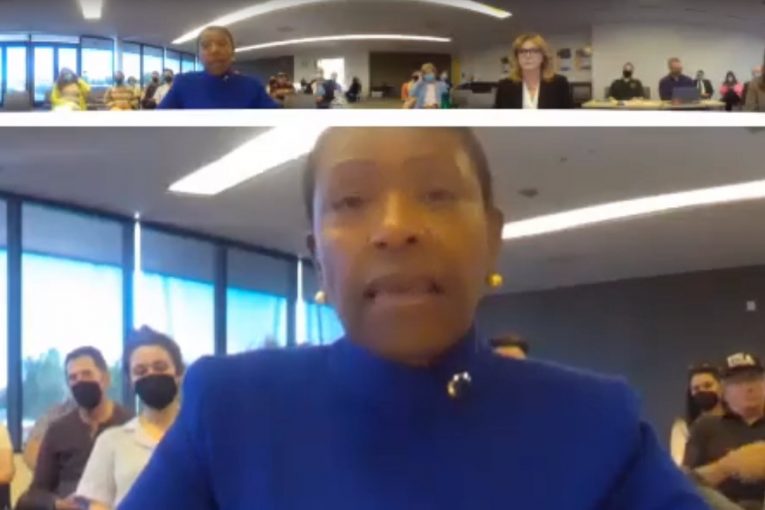
 By David M. Greenwald
By David M. Greenwald
Executive Editor
Pleasanton, CA – Incumbent DA Diana Becton of Contra Costa County met with her challenger Mary Knox on Tuesday for a candidates forum hosted by Gina Channell Wilcox and Jeremy Walsh of the Pleasanton Weekly.
Becton, a Costa Costa County Superior Court judge for 22 years, was appointed as DA and then in 2018 won support of the voters. Mary Knox has worked as a prosecutor for 37 years in the DA’s office after graduating from Pepperdine Law School.
Question: We’ve had a number of questions from residents asking about specific decisions by the DA’s office in the last four years, whether it’s a case with a controversial plea bargain or a choice not to pursue criminal charges… Can you walk us through your mindset when you make those often difficult decisions, either in the past or going forward? What key factors are at play when contemplating a plea deal or charging decision in a high profile case, and how involved is the district attorney in that process?
Diana Becton: “There are several factors in, um, our penal code that would also be taken into account whether they have a criminal history whether this was a scheme or, or any other type of organized event. So, so many factors that could go into play, but the supervisors of those units really have the autonomy, not only to file their cases, but also to enter into the plea bargaining process. So it’s very seldom that the district attorney is actually involved in those decisions. There are certain very high level cases where we might take a round table with the entire management team to be able to come to a conclusion, a decision as to whether or not a case should be filed, and also whether or not a case should be  plea bargained. But for the most part, those units are supervised and staffed by experienced attorneys who are able to make those decisions.”
plea bargained. But for the most part, those units are supervised and staffed by experienced attorneys who are able to make those decisions.”
Mary Knox: “For example, when I was supervising the homicide unit I routinely was making decisions on homicides that were filed throughout the county, in addition to gang homicides. but I routinely spoke with the then DA Mark Peterson and with DAs and prior DAs about high profile cases and the filing considerations and discussed those filing considerations with the DA. not in a hands off approach, but the DAs that I worked under previously were very hands on and involved in the inner workings of our office, particularly in cases that involved, significant public safety or, high profile issues.”
She noted “the Airbnb in 2019 on Halloween night where five people were murdered and there was such terror in that house that people were literally jumping off second story balconies breaking legs on their way down. That case was brought in for filing by the Sheriff’s office who assisted the Orinda police department in that investigation. It was all very gang involved, involving gangs from Richmond, Oakland and San Francisco. That house was loaded full of video cameras. And all of this was organized on social media attracting people to that party. And that case was presented for filing by the Sheriff’s office and the current DA decided not to file on the bloodiest massacre in Contra Costa’s history, rather than working with the Sheriff’s office and the Orinda police department with the tremendous resources we have in the DA’s office. That case was just rejected for filing and sent a very clear message to gang members that things had essentially changed in Contra Costa County.”
Diana Becton responded, ‘I think it would be really good at this table if we dealt with the facts of the case, we have to really understand that when that, that terrible, terrible, massacre happened in Orinda, the Sheriff’s office did bring a case into our office for prosecution. There was no individual who made a decision about that case. We had our most experienced prosecutors in the office, including a prosecutor who had prosecuted, not only gang cases, but also over 25 death penalty cases in the county.”
She continued: “They met all day with the team from the Sheriff’s department. The Sheriff’s department even admitted they did not have enough evidence to be able to charge those individuals with the horrendous crimes that were committed that night. It was a decision that was made not only by the most experienced prosecutors in the office, the head of the homicide unit, the head of the gang unit, and also our management team that round tabled this case. It was not an arbitrary decision. We came to the conclusion and even the Sheriff’s department had to conclude that we had insufficient evidence to bring charges and to prove the case beyond a reasonable doubt.”
Question: What policies do you support to ensure fair and unbiased use of prosecutorial discretion and juvenile cases, not only in the areas of diversion program and youth incarceration, but also when your office would decide whether to charge a minor in adult court?
Mary Knox: “Certainly juvenile court is very unique. it’s very different than adult court. So the juvenile probation department, has a tremendous amount of influence on the case that for example, cases come to juvenile probation at the very beginning of the process and juvenile probation, frequently diverts children out of the criminal justice system into social service programs into the diversion programs. And it’s a frankly, an unusual case that a case is actually referred to the DA’s office for filing charges. And once the charges are filed, then the decision to detain a minor meaning in juvenile hall, that is made by recommendations through juvenile probation. They have psychologists and social service workers that write a detention report that makes a recommendation to the juvenile jail about whether or not a minor is detained with the criminal charges filed.”
She continued: “Then with regard to, to the decision, whether or not a minor for certain qualifying crimes, for example a homicide or a rape that’s committed after a minor turns 16, that is all done through what’s known as a transfer hearing. And that hearing is done in front of a juvenile judge. And evidence is all kinds of evidence related to the crime, related to the minors prior history, related to any, um, psychiatric or psychological issues. And then it’s the juvenile judge who determines whether or not a minor is prosecuted in court. So the checks and balances are really very strongly within the juvenile court system itself and not within the DA’s office.”
Diana Becton: “So in terms of the policies that I would support, I’ve already mentioned that we have the opportunity, um, to be able to consider when a minor might be appropriate for our diversion program, our restorative justice program. It is correct that for the lower minor, low level offenses, those are normally handled with our probation department. Although we work very closely, hand in hand with them on policies and programs that might be appropriate for the supervision of youth within our community, without incarceration, but as to the more serious cases, those that might be eligible to be transferred to adult court. One of the things that I’ve done is to completely revamp that process. The decision used to be made solely within our homicide unit, by the adult homicide supervisor. But now we’ve really revamped that, especially now that the decision, uh, as to, as to the transfer has now returned to the court in the hands of the judge.”
Question: An increasing scourge in all of our communities is illicit fentanyl on our streets and the resulting impacts such as overdose deaths and exacerbating addiction problems. What role can the DA’s office play in combating this issue? How can you work to ensure that individuals who deal these types of illicit drugs, and more importantly, their manufacturers and suppliers are held accountable, accountable in court for their actions? And especially with regard to overdose deaths caused by their dangerous product.
Diana Becton: “if people are apprehended in our county for actually being those who are responsible for selling drugs and especially these serious kinds of drugs, like fentanyl that can so easily take the life of another person, those cases are going to be taken very seriously. That would be a felony charge, and they will be charged appropriately and proceed through our court system.”
She added, “If we find that there is clearly a connection between the sale of drugs and a person, and then if that sale of drugs results in an overdose and a death, then we certainly have the capability and we would pursue murder charges against that person who sold drugs to the person who then overdose, assuming that we could of make that logical connection.”
Mary Knox: “The dismantling of drug enforcement teams over the past about six years have resulted in this huge increase in drugs, moving across our border with the cartels. And the fentanyl is now coming into the state of California from Mexico. And not only is the fentanyl being sold as pills. It’s also being used to lace other drugs, such as cocaine and methamphetamine, so that very unsuspecting drug users are actually ingesting fentanyl and amounts that they can’t even control. So there has to be a refocus on the cartel and the organized crime drug activity in the state and begin to address this massive volume of drugs coming into California from Mexico.”
She added, “So we need to refocus on that. And then also the fentanyl related deaths, as well as other drug related deaths, such as heroin overdoses, certainly should be referred to federal agencies who actually can do that type of homicide charging and investigation.”
Question: We are aware in many fields, public and private, there are issues with employee retention and recruitment, really coming to the forefront since the onset of the pandemic. How would you describe employee morale and staffing levels within the DA’s office today and how positively or negatively does that affect the department’s ability to do its duty?
Mary Knox: “In the past four years, the DA’s office has lost 57 attorneys. And to put that into perspective, we’re staffed for 104 attorneys. And not only are these more junior attorneys leaving, these are attorneys leaving with 27 years of experience, for example. we’ve literally lost hundreds of years of experience. They’ve walked right out the door and why it’s so, so crucial for our DA’s office, we can’t hire laterals. So when we lose someone with 27 years of experience, they’re replaced by an attorney who’s fresh out of law school. We’re having difficulty staffing our homicide units, our gang units, our sexual assault units, because we don’t have the attorneys with the experience necessary to either run those units or prosecute the cases. The morale in our office is at an all time low, and that all needs to turn around.”
Diana Becton: “This is another area that we explored in depth with Dan Borenstein and actually we’ve had articles written in the Chronicle as well, because it’s really not accurate that we have droves of attorney leaving the office. We have the capability for 105 attorneys in our office. And we are at, or near capacity with the number of attorneys we have. But more importantly, I actually had the data that I was able to turn over to the East Bay Times to show that attrition in our office has not changed over the last 5, 6, 7 years. It has been the same since, well, before I arrived. And it is about the same now.”






